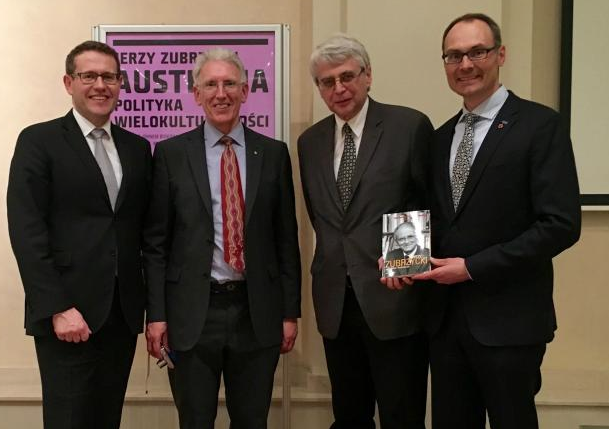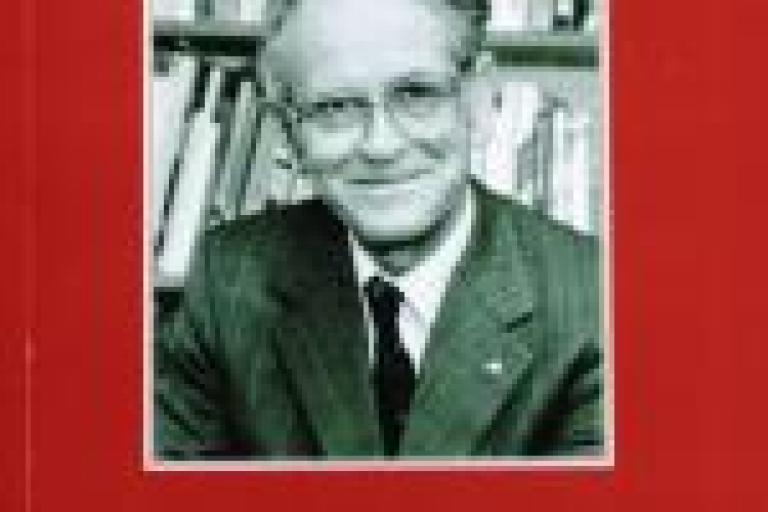Jerzy Zubrzycki was known as the ‘father of Australian multiculturalism’. As an academic, public intellectual, and advisor to the Whitlam, Fraser and Howard governments, Zubrzycki contributed greatly to the foundation of Australia’s policies on multiculturalism and social inclusion.
IofC workers John Bond and the late John Williams co-authored a book about Zubrzycki’s life, which was launched in a Polish-language translation in 2017. Two events marked the release of ‘The Promise of Diversity’ in Polish: an event at Krakow’s International Cultural Centre on 11 April, and another at the Polish Academy of Science in Warsaw on 29 September.

(L. to R.: Australian Ambassador Paul Wojciechowski, John Bond, Prof Jacek Purchla, Adam Koniuszewski of The Bridge)
Mary Lean was at the Krakow event, and noted: ‘Australia experienced a social revolution in the 1970s and 1980s, as I realized when I listened to a doctor I met in Krakow... When he and his parents arrived in Australia from Poland in the 1960s, they were treated as second-class citizens. He spoke only Polish, and was left to struggle without help at school. Years later, by then living back in Poland, he accepted a four-year post in Australia and took his son with him. His son’s experience at school was completely different: he was assigned a special tutor, who translated everything in the school classroom for three months, by which time he was fluent enough to manage on his own. One of the many Australians who worked for this change of approach was the Polish-Australian sociologist, Jerzy Zubrzycki.’
Zubrzycki passed away in a Canberra hospital in 2009, but his legacy lives on. His biographer, John Bond, told the audience of 140 people in Krakow that, ‘We wrote the book when this aspect of [Zubrzycki’s] work was under threat, with a prime minister who sought the votes of the majority community by attacking minorities.’
Paul Wojciechowski, Australian Ambassador to Poland, presided at the launch events in both Krakow and Warsaw. He noted that one-third of all Australian ambassadors today were born outside Australia – a remarkable statistic which testifies to the social revolution to which Zubrzycki had devoted himself. Wojciechowski himself emigrated from Poland to Australia with his parents as a child.
At the Warsaw event, Jan Pakulski, Professor of Sociology at the University of Tasmania and also a staff member of Warsaw’s Collegium Civitas University, led a discussion on Australian multiculturalism. The 90 participants in the event included the directors of the social science institutes in the Polish Academy of Science, a former Minister of Defence, former Polish Ambassadors to Australia, and representatives of the Ministry of Foreign Affairs. Also participating was Anna Zubrzycki, daughter of Jerzy.
Pakulski noted that Australia’s policies on multiculturalism were developed in response to rapidly diversifying sources of immigration after World War II. Non-British immigrants were experiencing widespread discrimination, and the human capital that they brought to Australia was being wasted on a massive scale.
In the 1960s and early ‘70s, a group of activists and academics – including, notably, Zubrzycki - formulated an alternative strategy. Whereas the immigrants’ ‘original’ cultural traditions, social attachments and identities had been seen as obstacles to successful integration, multiculturalism redefined them as essential. Ethnic structures had a vital role, provided that these structures integrated immigrants into the broader society, and did not encourage separatism.
When multiculturalism was adopted as official policy in the 1970s, it caused a minor revolution in public attitudes. ‘The Australian form of multiculturalism,’ Pakulski concluded, ‘has achieved a high degree of immigrant integration while receiving strong public approval and bipartisan political support.’
Anna Zubrzycki spoke about the personal challenges confronting her parents, arriving in Australia after traumatic wartime experiences. John Bond said that these experiences had shaped Zubrzycki’s contribution to Australia. ‘His contribution was not just in the field of multiculturalism,’ he said. ‘Zubrzycki also worked with Polish colleagues to overcome the rift with Jewish Poles, many of whom had fled to Australia after the war, and much healing has resulted. He worked to create a society in which every person could contribute fully, and Australia is a far better country as a result.’

Jerzy Zubrzycki’s biography, ‘The Promise of Diversity’, was published by Grosvenor Books in 2013. Academic Joanna Nurmis translated the book into Polish, and Neriton Publishers in Warsaw published it as Jerzy Zubrzycki: wielki Polak i Australijczyk.
- ‘The Promise of Diversity’ is available from IofC Australia. See a reader’s review here, and email info.au@iofc.org to order a copy.
Header image: successfulcommunities.org.au

